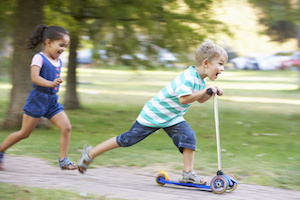 One of the greatest skills you learn as a parent is anticipation. The ability to read your children and see what they need before everything turns to custard is invaluable, even if it is an inexact science.
One of the greatest skills you learn as a parent is anticipation. The ability to read your children and see what they need before everything turns to custard is invaluable, even if it is an inexact science.
Particularly when children are very young, it is in everyone’s best interests for them to be well fed, well rested, well exercised and appropriately entertained. It is inevitable that children ‘lose it’ every now and again (they’re only human after all), but there are steps you can take to limit such meltdowns. However, when meltdowns occur, managing them swiftly and effectively is crucial.
Last weekend, while I was out and about with my own three children, I witnessed a couple of families letting their children’s behaviour going badly south – neither of whom were able to salvage the situation. The result was really uncomfortable for not only the family, but for all the strangers around them.
Being a parent requires monumental patience. Thankfully the love we feel for our children fuels patience (most of the time!). But, when all the warning signs are pointing to danger, sometimes you need to throw out the rule book, or remove yourself from the situation.
Children tire quickly. As adults, we know how hard it can be to be as patient, reasonable or sensible when we are overtired. When you’re small and can’t communicate clearly, this often leads to tantrums. Tantrums are normal, but how long it is okay to involve perfect strangers in your child’s meltdown?
At a busy park, I saw a mother dealing with a child who, by the looks of things, had been causing her mother angst for some time. The mother was remaining far calmer than I probably would have, but after 40 minutes of the child bellowing, screaming, stamping and pleading (it became something of a game to some of the onlookers, including me to see how long they would last), we wanted them to leave. The mother, daughter, three other siblings, father and dog were having no fun, nor was anyone else.
The mother had changed her tack numerous times (I’ll count to three, go over there and sit down, Dad will take you home if you don’t stop, there’ll be no dessert etc), so the child was overwrought, confused and too upset to see sense. To compound matters, they had arrived at the park on bikes and scooters, so the poor parents had to take home four small children (three of whom were in tears by the time they decided to leave) and a dog, on foot. One wonders if they were still speaking by the time they arrived home..?
When you child is badly upset, even if they’ve been a little toad, parents need to remain calm, and see to their needs, then talk to them once they have settled down. For trips on bikes to a park, little children’s batteries wear out fast. They need snacks, and ideally you should set off for home long before they are overtired, even if it means leaving while everyone is having a great time.
To say that you never hear other children’s cry is incorrect – this little girl had everyone’s attention. While our hearts were with the parents, it was a relief when they left. Intervening didn’t seem like the right thing to do – nobody likes to have their parenting questioned – but they looked like they needed help, and eventually, so did the other park visitors – to enjoy themselves!
Afterwards, we went to a cafe for afternoon tea. It was a most adult environment, with people sitting in a courtyard, enjoying the winter sun, having a quiet drink and watching the Olympics on the big screen. In comes a family, again with three children, who looked like they were school aged, or just about to become so. They also came with scooters, which they proceeded to ride around the courtyard. It wasn’t a big area, and they were banging into ankles and the odd table.
Their waiter asked politely twice for them to sit down and leave the scooters behind the counter or under the table, to which their parents objected, “They’re fine, they’re having fun.”
This is unacceptable behaviour – from both the parents and the children – but the children were only following the lead of their parents. In an adult environment, other adults are entitled to enjoy their time in peace. Nobody minds having children included, if they are able to behave in a reasonable manner.
So, next time you are out with little peopletry and ensure:
- they are comfortable (eg warm/cool enough)
- they aren’t tired
- they are fed, little and often
- they know the standards of behaviour required for the environment
- if they cut up rough, you have an ‘escape plan’
- you consider the feelings/comfort of others around you
Do you have any other pointers to share?









Join the Discussion
Type out your comment here:
You must be logged in to post a comment.